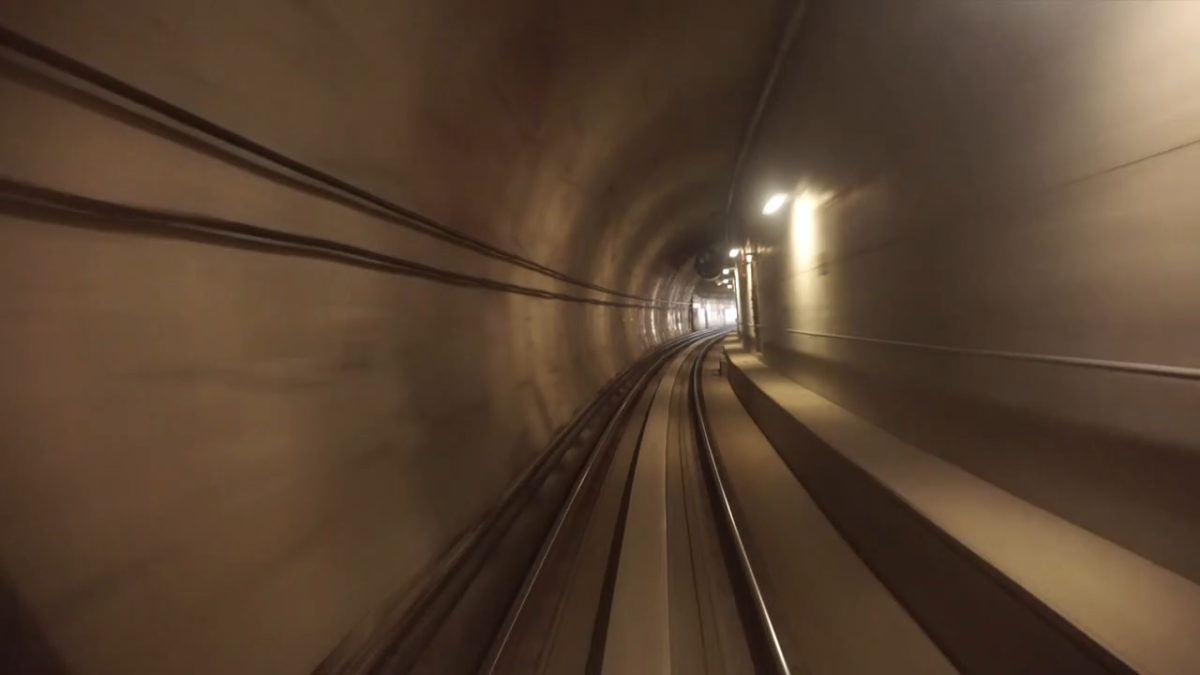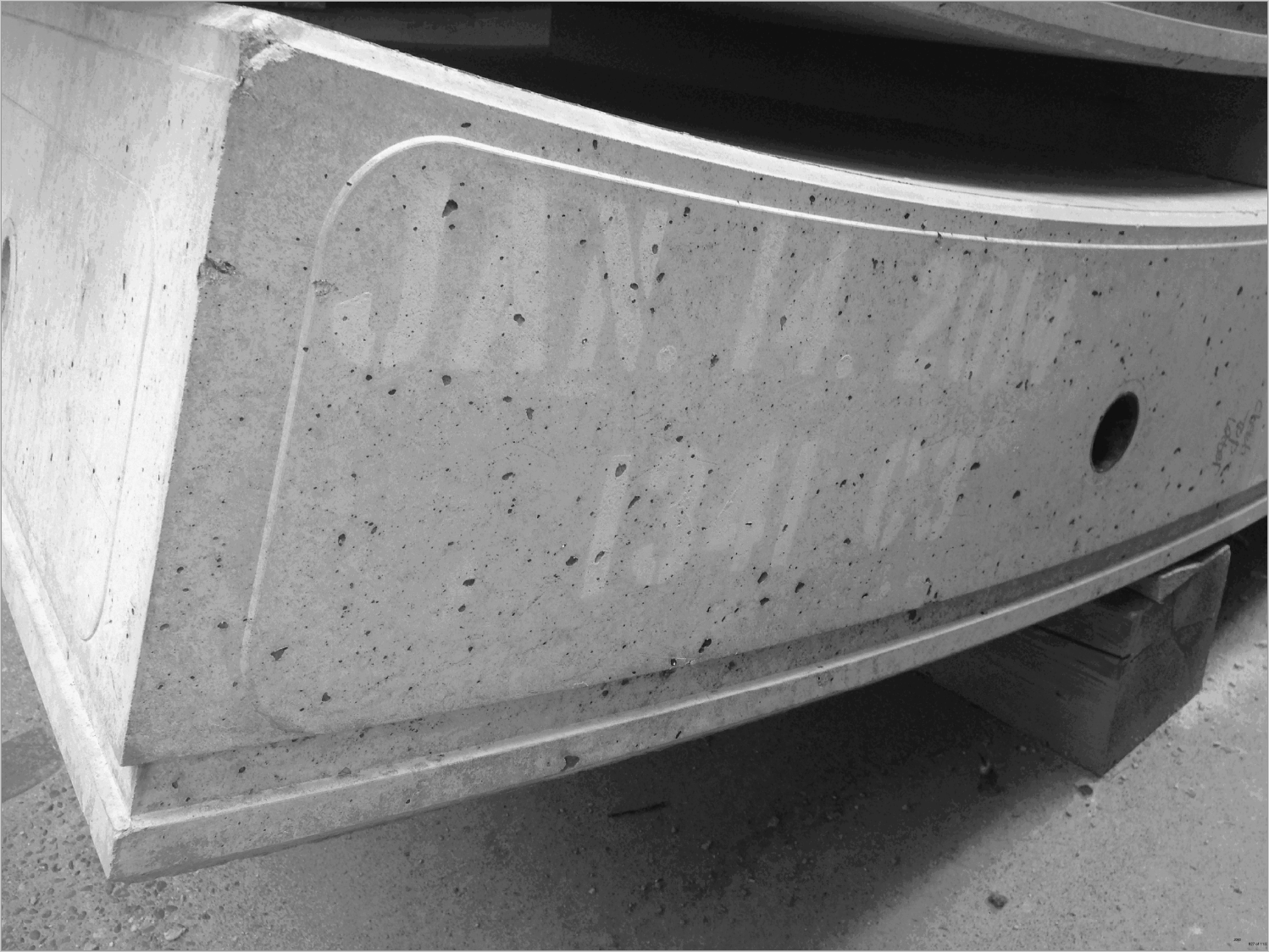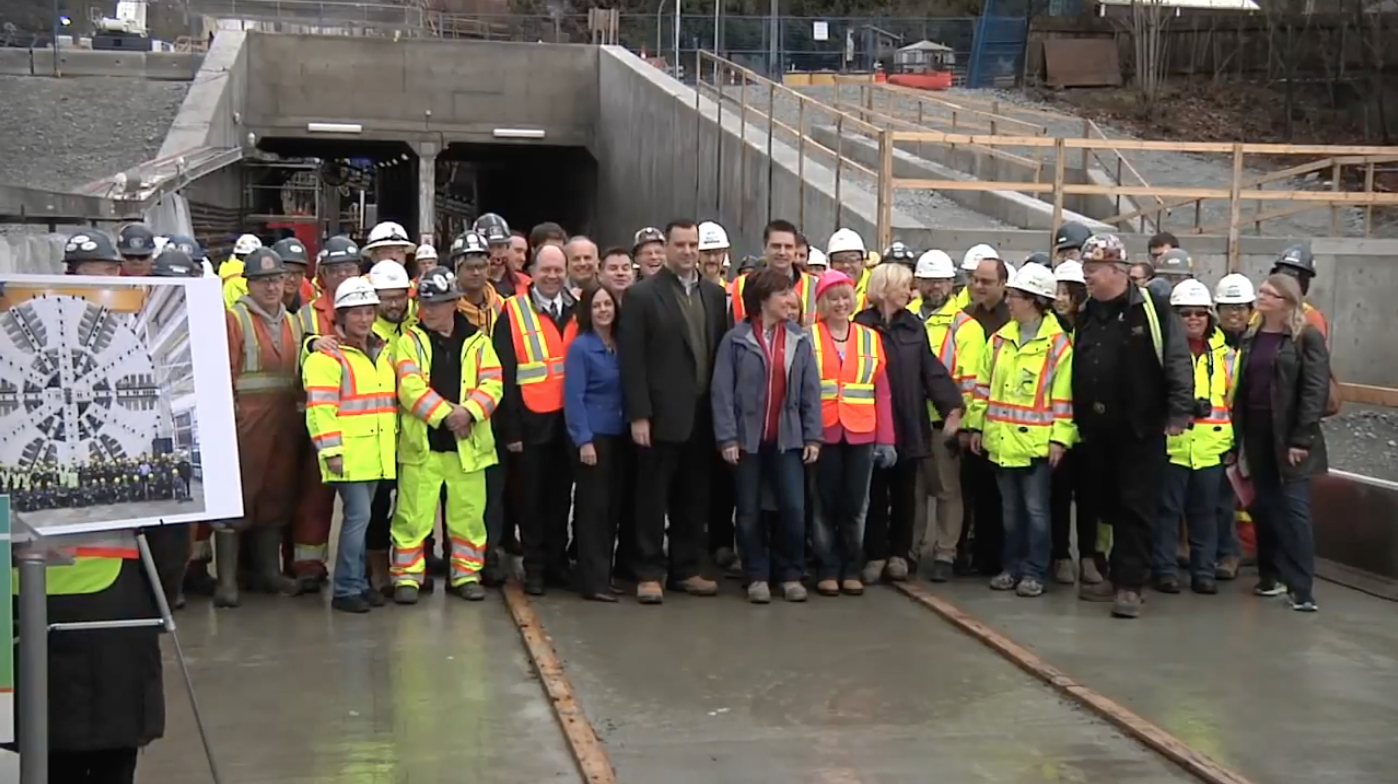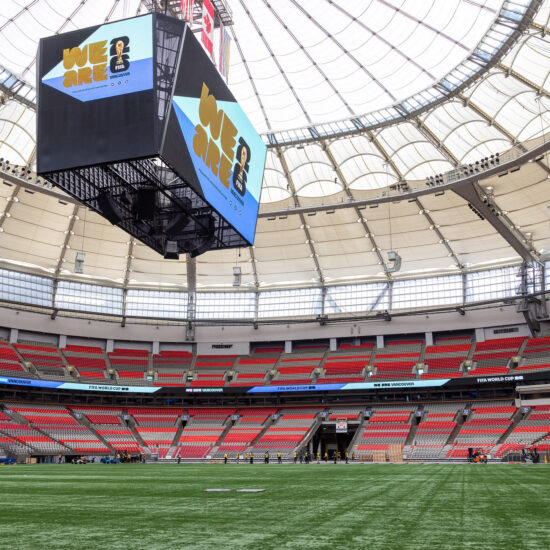
Bob Mackin
Hundreds of concrete segments that were made to line the walls of SkyTrain’s Evergreen Line tunnel were rejected because of overcuring by SNC-Lavalin’s Langley supplier.
But dozens of segments at risk of cracking were installed before the problem was detected more than four years ago, according to documents released under the freedom of information law.

Inside the Evergreen Line tunnel (Mackin)
EGRT, the SNC-Lavalin company that built the 2016-opened Millennium Line extension, asked the BC Liberal government to increase the maximum specified temperature for curing concrete from the standard 60 Celsius to 70 Celsius. APS Architectural Precast Structures of Langley even cured some of the segments at more than 80 C, furthering worries that the segments would expand or crack because of a phenomenon known as delayed ettringite formation, or DEF.
In a June 4, 2014 letter to her EGRT counterpart, Evergreen Line project director Amanda Farrell rejected EGRT’s request. She conceded that the province would accept segments already cured up to 70 C, but would not accept any new segments that had been cured above 60 C.
“For the tunnel liner segments cast between 70 C to 80 C, and not yet installed in the tunnel, EGRT has indicated that these segments in the yard will be rejected by EGRT,” Farrell wrote. “For the tunnel liner segments cast between 70 C to 80 C, and installed in the tunnel, EGRT has advised that there are 27 tunnel liner segments that fall in this category.”
More than three times as many were eventually installed.
SNC-Lavalin’s Jeff Spruston agreed two days later to Farrell’s demands that all overcured segments that had been installed would be identified and subject to regular inspection, monitoring and reporting. Support bolts were to be left intact to enable load sharing, should DEF occur. The standard two-year warranty would be extended by 10 years for the affected segments.
Farrell relied on the opinion of Halifax-based cement expert Dr. Wilbert Langley, whose April 28, 2014 report said that 70 C was “commonly accepted worldwide, and some authorities permit up to 77 C if supplementary cementing materials (slag, fly ash, silica fume) are used in concrete manufacture.”

Hundreds of Evergreen Line tunnel liner segments like this were overcured (BC Gov)
Wrote Langley: “It is our opinion based on the field data reviewed for concrete casting and curing and cement chemical analysis, that DEF will not occur. Also the finite element analysis on the units confirms high internal temperatures and temperature differentials have not had an adverse effect on cracking.”
Two local consultants had reservations, both emphasizing the urgency to keep the tunnel dry.
Christopher Howard of Hatch Mott MacDonald wrote May 29, 2014 that it was not practical to replace the segments in question, but secondary grouting and internal waterproofing may help achieve a dry environment. “Neither of these methods provide a suitable solution to this problem. It is therefore evermore necessary that the contractor is successful in achieving a dry tunnel environment with low ground water infiltration through high quality of ring build and annulus grouting,” Howard wrote.
Howard proposed inspections to monitor deterioration and leaving bolts in the segments.
On June 2, 2014, Russ Riffell of Levelton Consultants wrote in an email that DEF concerns remained unchanged, notwithstanding Langley’s expert opinion.
“If the environment could be controlled such that the subject tunnel liners would not be exposed to groundwater, we would be pleased to re-visit our opinion, but we understand that this is just not feasible,” Riffell wrote. “So we recommend that EGRT offer an extended warranty or some other form of guarantee acceptable to the province for the subject segments.”
As of Jan. 8, 2015, 1,375 segments cured at 61 C to 70 C had been installed or were waiting for installation, 78 were in the 71 C to 80 C range and one was greater than 80 C. Three weeks later, data shows that 449 segments had been rejected and 10,028 were available, with 356 still to be fabricated.
No safety risk, says project director
A statement attributed to Farrell was released with more than 5,200 pages of information and data about the troubled segments.
Farrell wrote that 82 tunnel segments were identified as being cured at higher than 70 C. Out of an abundance of caution, Farrell wrote, EGRT installed interconnecting bolts for load sharing between each segment and agreed to the extended warranty with annual inspections.
“After the 10 years, the tunnel will fall under the SkyTrain operator’s regular three-year inspection program for structures. Although the likelihood is low, should minor cracking and flaking in these segments occur, they will be repaired under this warranty using standard accepted repair procedures,” Farrell wrote. “Again, these segments will not pose any safety risks to the Evergreen Line or the travelling public.”
How did the contractor and/or subcontractor let so many segments escape quality control?

Clark christened the tunnel boring machine March 7, 2014 (BC Gov)
A Sept. 11, 2014 quality surveillance report said that the curing temperature of cast segments is monitored by a computer-controlled program in real time, but “there is no warning system of any kind when curing temperatures do not meet specified limits or when trends project temperatures may exceed specifications.”
APS quality control manager Suhoon Bae wrote on Oct. 20, 2014: “The system APS is currently using has an alarm-function for fault-temperature sensors; with the help of this function, APS [quality control] assigns one personnel for continual monitoring the temperature development over the time and peak temperature. The steam system is automatically turned off when the peak temperature of the segment reaches to the pre-setting temperature.”
Claire Trevena was the NDP’s transportation critic until last July, when she succeeded BC Liberal Todd Stone as minister. But her staff refused to arrange an interview or answer theBreaker’s questions about when or if inspections of the segments have occurred. Trevena spokeswoman Katie Robb referred theBreaker to Partnerships BC, the government’s privatization and infrastructure agency, and TransLink.
Neither TransLink nor PartnershipsBC responded.
TransLink’s board of directors and the Mayors’ Council are scheduled for a June 28 joint meeting to rubber stamp the Broadway subway, which has ballooned in price by more than $600 million to $2.83 billion. Like the Evergreen Line, the Broadway subway will be a bored tunnel.
Scandal-plagued, Montreal-based SNC-Lavalin has been involved in every phase of SkyTrain development and is expected to bid when TransLink goes to tender for the Millennium Line extension to Arbutus. SNC-Lavalin was awarded the Evergreen Line contract in 2012, after its then-chair, Gwyn Morgan, had been a member of Premier Christy Clark’s transition team.
The problem with the overcured segments was one of a series of unfortunate 2014 events that beset the project, after Clark christened the tunnel boring machine on March 7, 2014.
Just a week after the photo op, a concrete span shifted over Como Lake Road and a worker suffered a concussion after a hose knocked him down on the same day.
WorkSafeBC investigated substandard tunnel exhaust ventilation in April and, in June, a launching truss fell on the guideway and a trailer carrying a concrete section flipped on a highway in Richmond.
Sinkholes and tunnel boring malfunctions under Port Moody and Coquitlam delayed completion by six months. It finally opened Dec. 2, 2016, yet, the BC Liberals claimed the $1.43 billion project came in $79 million under budget.
The Ministry of Transportation resisted disclosure of change order costs until summer 2017, when the NDP took over. As theBreaker reported late last year, the ministry said $19 million was spent on changes for items not included in the original contract and $17 million on unanticipated items.
Support theBreaker.news for as low as $2 a month on Patreon. Find out how. Click here.











